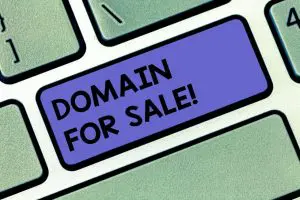Key takeaways:
- Some domains have sold for millions, and understanding what drives that value can help you set the right price for yours.
- Factors like keyword strength, domain length, TLD extension, industry relevance, SEO value, and current market demand all influence a domain’s value.
- Using a mix of comparable sales data, domain appraisal tools, expert opinions, and tracking market trends gives you the most accurate estimate of your domain’s worth.
“What is my domain worth?” It’s a question that many domain investors, business owners, and digital entrepreneurs ask, and the answer could be surprising.
Domain names, like PrivateJet.com ($30.18 million), Voice.com ($30 million), and NFTs.com ($15 million) have been sold for millions of dollars. This just means your domain name could be more valuable than you think.
But how do you calculate the value of your domain?
Figuring out a domain name’s value can be tricky. But don’t worry! In this guide, we’ll help you:
- Identify what makes a domain valuable
- Learn how to calculate domain worth
- Explore domain valuation tools
- Discover how to increase your domain’s value before listing or negotiating

What is domain worth?
Domain worth, also known as domain value, is the estimated monetary value of a domain name as a standalone asset.
Now don’t confuse domain worth with website value. Unlike a full website valuation, which considers content, traffic, revenue, and other factors, domain worth focuses solely on the domain itself. A domain’s value is usually based on factors like keyword strength, domain length, brandability, and market demand.
Domain worth vs website value
| Aspect | Domain worth | Website value |
|---|---|---|
| Definition | Refers to the price of the domain name itself — just the web address (e.g., example.com). | Refers to the overall business value of a live website — including traffic, content, revenue, and brand. |
| What determines it | Length, keyword relevance, TLD (.com, .io, etc.), branding potential, and market demand. | Website traffic, SEO performance, revenue, audience engagement, brand reputation, and assets. |
| Example | travel.com is worth millions even without content because it’s short, memorable, and keyword-rich. | travelguide.com could be worth more if it earns revenue through ads or affiliate marketing. |
To put simply: domain worth is the value of a plot of land while website value is the value of the house built on that land.
Why is it important to check your domain’s value?
Some people check their domain’s worth merely out of curiosity. Meanwhile, others do so to make the most out of an asset—yes, we’ve reached a point where a domain name is no longer just an online address. For domain investors, it has become a prized asset that can build trust, boost visibility, and drive profits.
Whether you’re planning to sell, buy, rebrand, or invest, checking your domain’s estimated value can help you:
- Price it right when selling. If your asking price is too high, buyers might lose interest. Too low, and you risk losing thousands. An appraisal helps you find that sweet spot.
- Make smart buying decisions. You have to understand a domain’s market value to make wise investments. Just keep in mind that not every domain is worth its price.
- Strengthen your brand and SEO strategy. A domain with high search volume or industry relevance gives your company an edge in both branding and search rankings.
- Identify the best domains for flipping or long-term investments. Knowing your domains’ worth helps you decide which ones to hold, sell, or develop.
- Prepare for future resale or monetization. Even if you’re not planning to sell right now, understanding your domain’s potential can help you decide whether to build it out, park it, or list it later.
How to calculate what your domain is worth
Figuring out how much your domain is worth can be somewhat challenging, particularly if you’re not sure where to start. Whether you’re selling, buying, or just assessing your Figuring out how much your domain is worth can be somewhat challenging, particularly if you’re not sure where to start. Whether you’re selling, buying, or just assessing your domain portfolio, here are three simple methods to get the estimated value of your domain:
- Research comparable domain sales
- Use online domain appraisal tools
- Evaluate manually using market insights
Compare similar domain sales
Check out recently sold domains with similar keywords, TLD, length, and relevance. Then, you can use resources like DNJournal, NameBio, and marketplaces like Sedo or Flippa to track pricing patterns.
For instance, you own easymealrecipes.com. To research comparable sales, you could search for keywords like “easy meal recipes” or “easy meals” on Sedo’s marketplace. You might find domains like recipeseasy.com priced at $12,099 and easytastyrecipes.com listed for $100,000. This gives you a range for estimating your domain’s worth.
Here’s a sample search from Sedo:

Use online domain appraisal tools
Domain appraisal tools can be handy if you want to estimate your domain’s worth. Most of these tools have advanced features that can analyze different factors easily and provide a range of values. However, the results are generated by algorithms and may not be 100% accurate.
Here’s a quick comparison of some of the most popular tools for domain name appraisal and valuation:
| Tool | Pricing | Key features |
|---|---|---|
| HumbleWorth | Free and paid tiers | AI-powered valuations Advanced AI algorithms Bulk portfolio reviews |
| EstiBot | Free and paid tiers | Bulk appraisals Keyword bid tool Access to expiring domains Market research |
| NameBio | Free | Free access to a $1.5 million domain sales database Advanced filters Historical pricing insights |
| Saw.com | Free | No sign-up needed Quick estimate Optional broker services |
Evaluate manually using market insights
No tool can replace your own insight, real market feedback, and expert advice. You can always manually evaluate your domain. Here are some practical ways to do that:
- Reach out to industry experts, potential buyers, or peers to get a better idea of market demand and pricing expectations.
- List your domain on marketplaces, like Sedo and Flippa, to test buyer response and pricing even if you’re not planning to sell right away.
- Consider professional domain appraisal services for high-value or premium domains. These experts analyze SEO metrics, backlinks, brandability, and market positioning for detailed valuations.
- Track industry trends through Google Trends, domain blogs, newsletters, and sales reports to understand demand shifts in your niche or TLD.
- Cross-check your valuation results from all methods and sources to come up with a realistic, fair price.
What are the factors that affect domain worth?
A domain can sell for a few dollars or a few million. This brings up the question: What factors influence a domain’s value? Here are the most important factors you need to know:
- Traffic and search volume
- Keyword relevance
- Backlinks
- Top-level domain (TLD)
- Domain length
- Domain age
- History and branding
- Market demand
Let’s take a closer look at the main factors that affect your domain’s value.
Traffic and search volume
Traffic is one of the most important factors that can influence a domain name’s worth. If the domain already attracts a good amount of traffic, it’s probably worth more.
BrightEdge reports that more than 40% of all revenue in major sectors, including eCommerce, tech, and B2B, comes from organic search alone. This means that organic traffic is highly profitable.
Domains that bring in organic traffic can immediately generate ROI for buyers, especially businesses and marketers who want to reduce advertising costs or capitalize on existing search demand.
Keyword relevance
Does your domain contain a high-demand keyword? If so, you’ve got an advantage.
Having a domain name that includes a popular keyword can boost its market appeal, especially if it reflects what people are actively searching for. For example, a domain name like BestRecipes.com tells visitors right away what the site is about. Since it matches common search intent, it’s easier to trust, click on, and remember.
Keyword-rich domains might not guarantee top search rankings, but they can help attract more organic traffic and are often more appealing to buyers.
Backlinks
Backlinks from trusted sites increase the domain’s authority. When reputable sources link to your domain, it shows both search engines and potential buyers that the site is credible.
For domain investors, this saves time and effort in building authority from scratch. That’s why it’s worth auditing your domain’s backlink profile using tools like Ahrefs, Moz, or SEMrush, especially if you’re planning to sell.
Top-level domains (TLDs)
The TLD or the domain extension, the part of the domain after the dot, also affects the value of the domain. In general, domains with a .com extension are typically the most valuable, as they’re the most recognized and trusted by users.
However, new generic TLDs (gTLDs) like .tech, .store, .app, and .online are gaining traction, especially in niche markets. According to Verisign’s 2024 Domain Name Industry Brief, new gTLD registrations grew by 23.2% year over year. This growth points to a clear rise in interest and demand for alternative domain extensions.
Domain length
Shorter domain names usually have higher value for a simple reason: they’re easier to remember, type, and brand.
Think of domains like Voice.com, Hotels.com, or NFTs.com. Their conciseness and simplicity make them perfect for branding and marketing, which is why they often sell for premium prices.
This is especially true, as backed by data—people clearly prefer shorter domain names. According to Gaebler’s study, the average length of the top 25 most popular websites is just six characters.
Domain age
Over time, domains accumulate history—whether good or bad. A consistently active and well-maintained domain is viewed as more trustworthy and credible. Add to that, older domain names have had more time to build trust, credibility, and authority, which adds SEO value.
You can check a domain’s age using tools like Whois Lookup, which also reveals how the domain has been used over time.
Market demand
A domain’s worth often depends on what’s currently in demand in the market. Even if a domain is brandable and has strong keywords, it won’t sell for a high price unless it matches what buyers are actually looking for.
That’s why it’s always best to keep an eye on current consumer trends to determine a domain’s potential worth. Domains tied to current events or rising technologies can suddenly spike in value. For instance, the surge in interest around blockchain and Web3 led to premium sales like NFTs.com, which sold for $15 million.
How to increase your domain’s worth
Here are some simple tips to make your domain more attractive and potentially increase its value:
- Add a landing page or simple website
- Develop a consistent and memorable brand
- Build backlinks and generate traffic
Let’s go through them one by one.
Add a landing page or simple website
Having a functional website or a simple landing page on your domain can show prospective buyers that the domain is usable and has a purpose. Here’s how to do it:
- Choose a simple builder like Carrd, Notion, or Google Sites.
- Showcase your site’s or domain’s niche relevance with clear, persuasive messaging.
- Add helpful content, like a blog snippet, industry news, or a resource guide related to the domain’s theme.
Develop a consistent and memorable brand
People remember a brand that tells a story. And your domain name is where that story begins. The more memorable and trustworthy your domain is, the more value it holds in the eyes of possible buyers.
Here’s how to build a brand identity that boosts your domain’s market value:
- Choose a brand-aligned domain.
- Use a simple, clean design that looks professional.
- Use a color palette and font style that matches your brand’s vibe.
- Make sure your brand has a consistent voice. Your brand messaging, from taglines to landing page copy, should always sound like it’s coming from the same source—you.
Build backlinks and generate traffic
Backlinks from reputable and relevant websites build your domain’s credibility and improve its search engine authority. Over time, this makes your domain more appealing to buyers and increases its market value.
You can build backlinks by:
- Creating quality content relevant to your domain’s niche that others want to link to
- Contributing guest posts
- Getting featured on trusted websites
- Reaching out to industry influencers who might link to your domain
- Engaging in relevant online communities
- Monitoring your backlink profile with tools like Ahrefs or Moz and disavow low-quality or spammy links to keep your profile clean
Common mistakes to avoid when valuing your domain
While domain valuation can lead to significant profit, it’s a market with pitfalls for the unwary. Avoiding common appraisal mistakes and recognizing scams are just as critical as understanding what makes a domain valuable.
Here are the biggest domain valuation mistakes you must definitely avoid:
- Relying on automated tools
- Ignoring comparable sales data
- Overemphasizing exact-match keywords
- Neglecting domain history
Relying only on automated tools
Automated appraisal tools are useful for a quick starting point, but they are notorious for being wildly inflated or severely undervalued. They often calculate value based only on keyword data and can’t account for brandability, buyer intent, or current market demand. Never use a single automated number as your final price.
Ignoring comparable sales data
The market only cares about what similar assets have actually sold for. Failing to research recent sales of domains with the same TLD, length, and keyword type is the fastest way to misprice your asset. Always prioritize real comparable sales over any tool’s estimate.
Overemphasizing exact-match keywords
While a domain like bestbluewidgets.com has marketing value, its worth is no longer determined by how much traffic it automatically gets from search engines. Google has largely de-prioritized the SEO value of exact-match domains. Focus instead on the name’s memorability and brand potential.
Neglecting domain history
A domain that was previously used for spam, phishing, or was penalized by search engines can be worthless despite having a great name. Always check the domain’s past via tools like the wayback machine to ensure its history is clean.
Frequently asked questions
The cost of a domain name can differ depending on the type of domain you choose. Standard domains usually cost around $10 to $20 per year, but premium domains—which are shorter, brandable, or in high demand—can cost hundreds or even thousands of dollars. Specialty domains, like those ending in .tech or .store, might also be priced higher. Your final price could also change if you’re using discounts, promo codes, or bundling services.
You can sell your domain on popular marketplaces like Sedo and Flippa. Some domain owners also work with brokers who specialize in high-value sales. Listing your domain on multiple platforms and marketing it to the right audience is also another option to attract better offers.
Yes, a domain can lose value if market trends change, the keyword becomes less relevant, or a newer extension becomes more popular. Expired domains that aren’t maintained or domains tied to fading industries may also see a drop in their worth.
It’s a good idea to check your domain’s value at least once a year. You might want to check more frequently if your domain is connected to a trending industry, you’re planning to sell soon, or you notice shifts in keyword trends.
Many online tools offer free domain appraisals, like Estibot and NameBio. However, for more detailed, expert-reviewed appraisals, you might need to pay a fee. Paid appraisals can be worth it if you have a high-value domain or need a reliable estimate for selling.
What makes a domain premium is its combination of qualities like brevity, memorability, keyword relevance, and a trusted extension (usually .com). These factors make it highly sought-after, easy to brand, and valuable in competitive markets.
First, determine your domain’s value using appraisal tools and market research. Next, list it on popular marketplaces like Sedo, Flippa, or GoDaddy Auctions to reach buyers. You can also work with a domain broker for highly valuable domains.
Make sure to create a clear, attractive listing with relevant details. Finally, negotiate offers and use a secure escrow service to complete the transaction safely.
Find out what your domain is really worth
At the end of the day, figuring out your domain’s worth is a must, whether you’re looking to buy or sell. To get your domain’s estimated value, look at similar domains, use appraisal tools, and monitor market trends.
Now it’s your turn. Whether you’re evaluating a single domain or your entire domain portfolio, use the suggestions and tools we shared to check out your domain’s value.
Don’t own a domain yet? Search and register your perfect name with Network Solutions.





